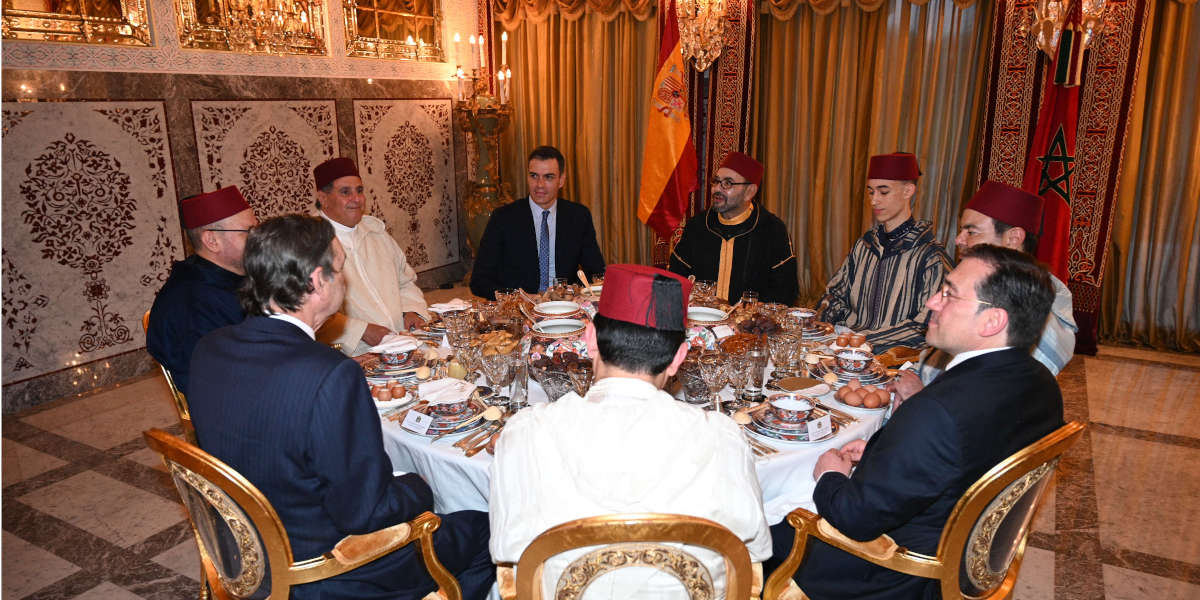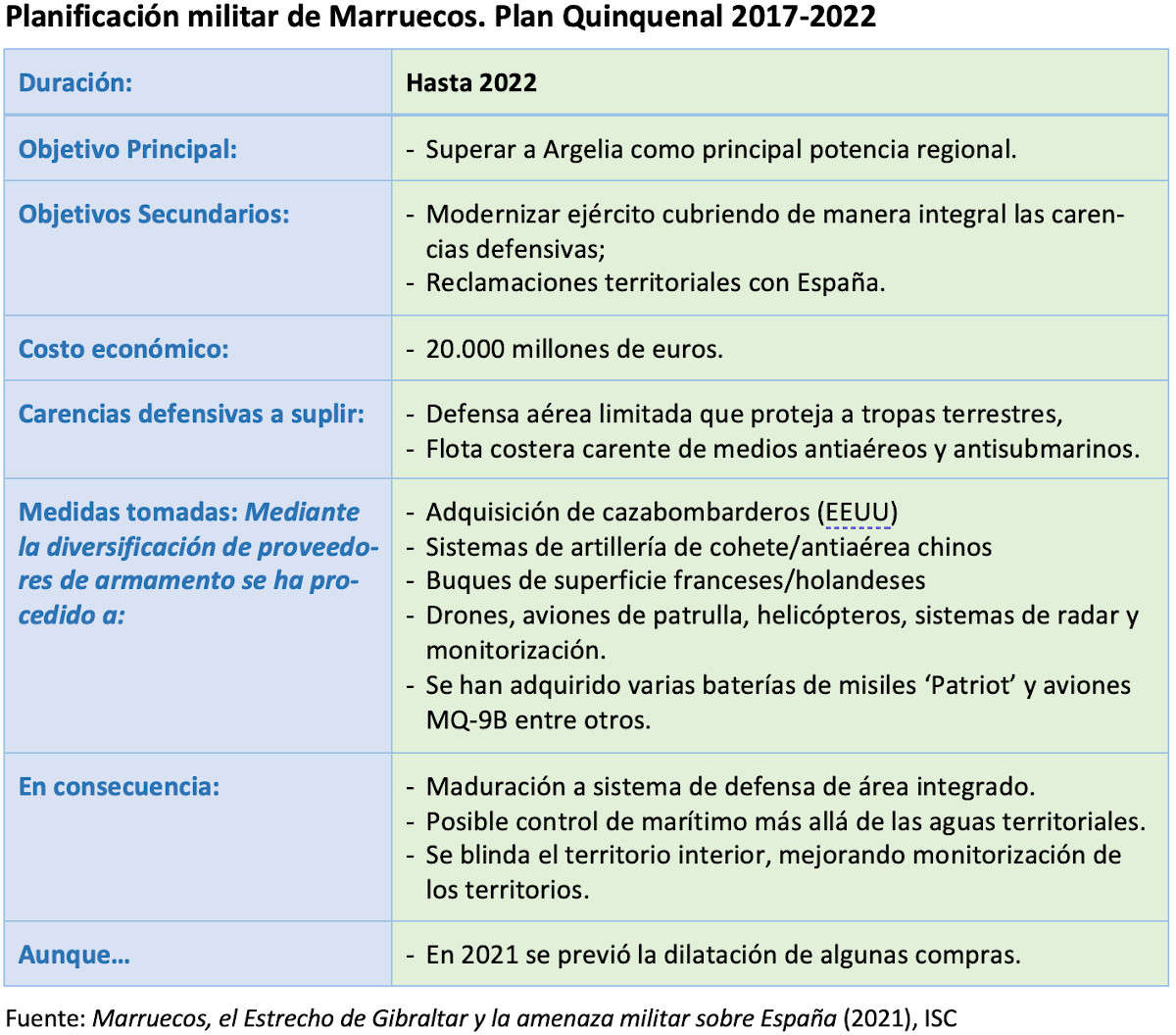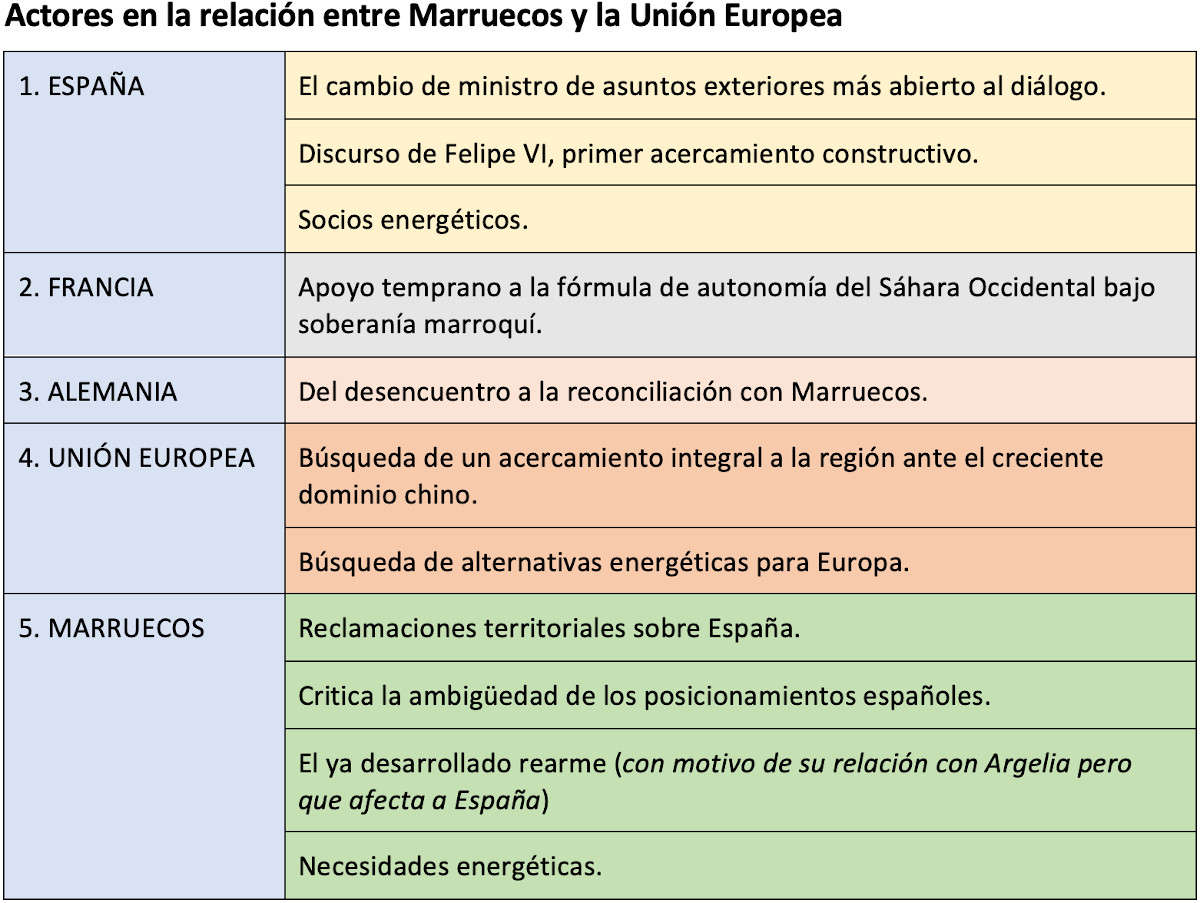In the picture
meetingin Rabat on 7 April 2022 between the head of the Spanish government, Pedro Sánchez, and King Mohammed VI [Puig de la Bellacasa].
In recent years, Morocco has embarked on an ambitious arms programme that could make it the leading military power in the Maghreb. This rearmament stems primarily from its complex and increasingly tense relationship with Algeria - the two countries have severed diplomatic relations - but also from its expansionist ambitions and regional influence.
This complex status does not fail to affect Spain, which has tried to reorient its relationship with Morocco and Algeria in an effort to set itself up as a mediator between the two countries, only to end up recently showing itself receptive to Morocco's thesis on Western Sahara. Spain's position must take into consideration the energy implications of the conflict, given its dependence onAlgerian gas, and since the current war between Russia and Urania may lead to a reorientation of European energy policies as far as gas is concerned.
Diplomatic relations between Morocco and Algeria have never been easy. Starting from a status quo reached three decades ago, it has gradually deteriorated to the current moment of severed diplomatic relations.
The reasons behind the current statusstem from the Western Sahara conflict. Morocco has claimed the territory since Spain abandoned it in 1975, while Algeria has been supporting the Polisario Sahrawi Liberation Front; in reaction to this support, Morocco has argued at the UN for self-determination for the Algerian Kabyle people, at odds with Algiers. The already tense relationship worsened in May 2021 with the killing of three Algerian civilians on the border between Western Sahara and Mauritania, which Algeria blamed on 'Moroccan occupation forces'. A similar incident in 2020 led the Polisario Front to end up breaking the 1990 status quo and resume attacks on Moroccan targets in the area, to which Morocco responded.
During the last years of Bouteflika's mandate (1999-2019), Algeria tried to regain control over Western Sahara, in reaction to Morocco's regionalist aspirations, materialised in its re-entry into the African Union in 2017 and its increasing diplomatic relations with neighbouring countries.
Since the summer of 2021, when Algeria broke off relations with Morocco, both countries have experienced an escalation of tensions. This resulted in a rupture finalof relations with Mohammed VI's decision in January 2022 to dismiss the Moroccan ambassador to Algiers, citing Algeria's lack of interest in restoring relations.
Two main events have marked the escalation of tension between the two countries. Firstly, the closure of airspace for Morocco by Algeria in September 2021. On the other hand, the closure of the Maghreb-Europe gas pipeline (branch that passes from Algeria to Morocco to reach Tarifa) in October of the same year. This movement has implied losses of 200 million euros for Morocco, but it has also affected Spain, since it is mainly supplied by Algerian gas and sees one of the two supply routes closed. To make up for this loss, an increase has been negotiated in the Issue of gas arriving directly to Spain through Medgaz (a pipe linking Algeria with Almeria and which has a smaller capacity, as it can transport 8,000 million cubic meters a year compared to the 10,000 million cubic meters of the other branch).
This is the context of Morocco's military build-up programme. goalTo understand this rearmament, which aims to ensure Morocco's military superiority over Algeria, one must go back to 2020, when US President Donald Trump made an explicit public endorsement of Morocco's position on Western Sahara in exchange for a diplomatic rapprochement between Rabat and the state of Israel that has led to closer ties on mutual security and defence issues. result
The establishment of relations with Israel in December 2020 has also been one of the reasons to understand Algeria's subsequent severing of relations in August 2021, as it sees these new Moroccan ties as a threat to its national security, especially following the memorandum of military cooperation signed in November 2021 between Israeli Defence Minister Benny Gantz and the Moroccan Defence Minister.
In response to this status, Algeria has increased its presence in Mali following the withdrawal of French troops and has become the third largest importer of Russian arms. It should be recalled that France has recently ended Operation Barkhane, but this does not mean that Europe is abandoning Mali, only that it is restructuring its presence in order to continue supporting Mali and the region.
Despite these moves, analysts point out that it is in the best interests of both countries to maintain the status quo, and that Algeria rules out in principle that the solution to this statuswill be an armed conflict.
Morocco: political strategy and regional pretensions
First, it is worth considering the implications of US recognition of the 'Moroccanness' of the Sahara. This move has completely displaced the role of European powers in their mediation efforts in North Africa, as it may allow Morocco to move beyond South-South international cooperation relations, becoming the central axis of Sahel-Maghreb-European cooperation relations.
On the other hand, markets in Africa are becoming increasingly attractive to the West, as are those of Russia and China, so Morocco now has a golden opportunity to emerge as a regional leader. Moreover, as proposed by the report subject"Morocco, the Strait of Gibraltar and the military threat to Spain', recently published by high schoolde Seguridad y Cultura, 'Morocco's status as a preferential ally of the United States outlines its image as a mediating and exemplary state for the rest of the African countries in counter-terrorism, diplomatic and economic matters'.
In discussing Moroccan pretensions, reportemphasises a period marked by the two milestones of 1999 and 2017, that is, from the coronation of Mohammed VI to Morocco's re-entry into the African Union. If, in the first instance, it was a quest for regional leadership, it is now a question of going further by achieving supra-regional leadership.
To this end, recognition of the Moroccan ownership of Western Sahara has been of great importance. Thanks to the policies of Mohammed VI from 1999 to the present, fifteen countries have now recognised Morocco's claims to the area.
However, the real turning point comes in 2019, as, following US recognition, Saudi Arabia was the first country to announce the opening of a consulate in the area, causing a 'pull' effect. This decision comes in the context of the triangular relationship of Saudi-Moroccan-US cooperation through IMAFT and the 'internal attrition of Algeria, the effects of terrorism in Nigeria, the civil war in Libya, the fall from grace of South Africa's humanist diplomacy or an Egypt torn between dependence and independence from the Middle East'.
Morocco, far from focusing on the military, is seeking an integral strategy based on three aspects: political, religious and economic. development. The first two are framed by its system of government, which allows it to empathise with both the republics with strong Sunni Salafism and the Arab monarchies, which, together with the use of French, allows the country to convey its ideals and influence in an understandable way that is easy to empathise with even in the Democratic Republic of the Congo.
As far as Economicsis concerned, Morocco, Africa's fifth largest power, has economic leadershipas goal, although it seeks to diversify its resources; Western Sahara's phosphates will be core topicfor this success. Furthermore, due to the border closure with Algeria, the transit of goods through Western Sahara is vital to achieve its objectives, which has led to greater investment in infrastructure by Rabat and the developmentof a projectwith Nigeria (a country that recognises the Moroccan status of the Sahara) to supply gas to the whole of Europe, known as the Nador Med Wers complex, close to Melilla and capable of competing with Algeciras or Barcelona. However, in order to do so, the Alaouite Kingdom must guarantee a modern army capable of fighting terrorism, keeping immigration at bay and making a success of state capitalism.
Finally, on the military front, the "Five-Year Plan 2017-2022", which aims to modernise the army, reduce dependence on foreign arms procurement, and unseat Algeria as a regional power, is worth highlighting.




